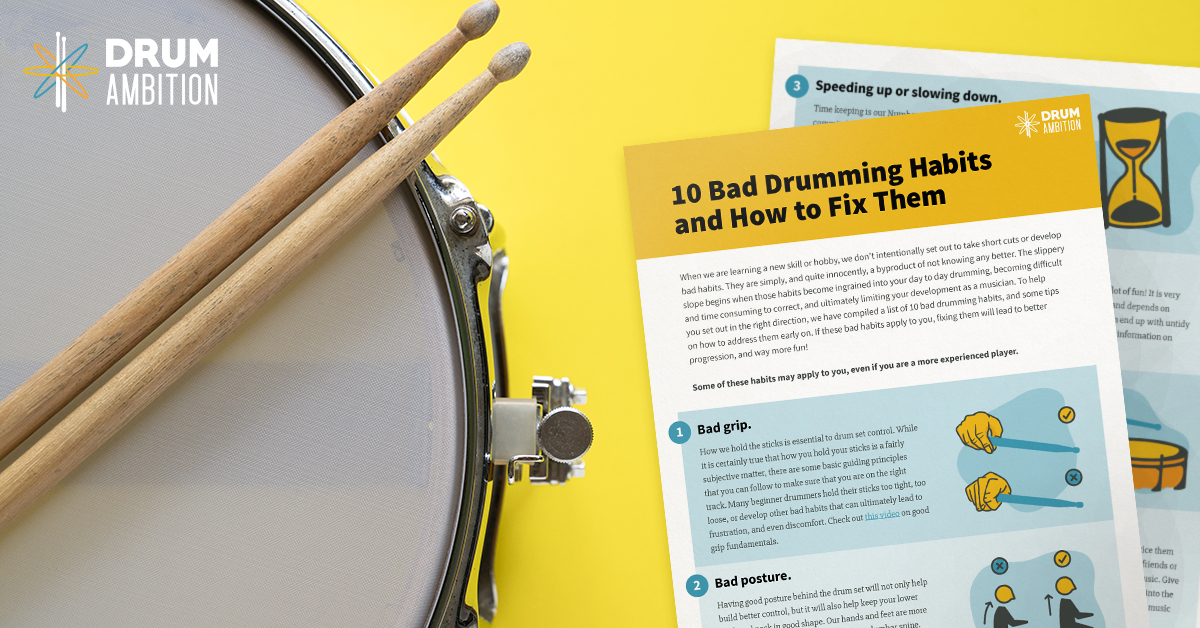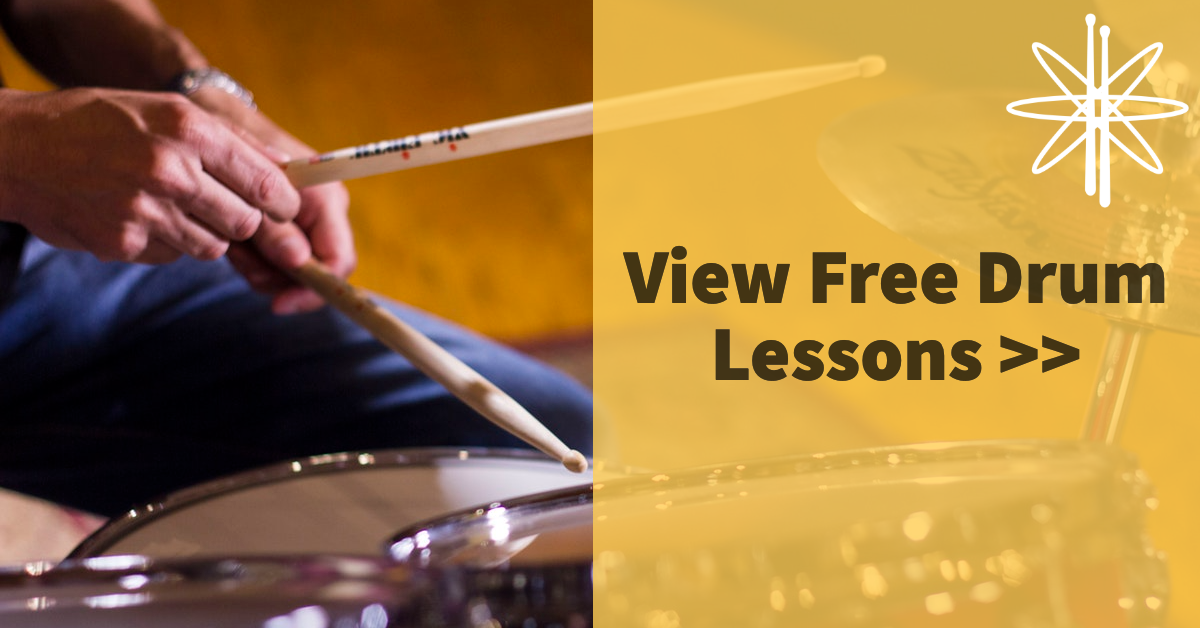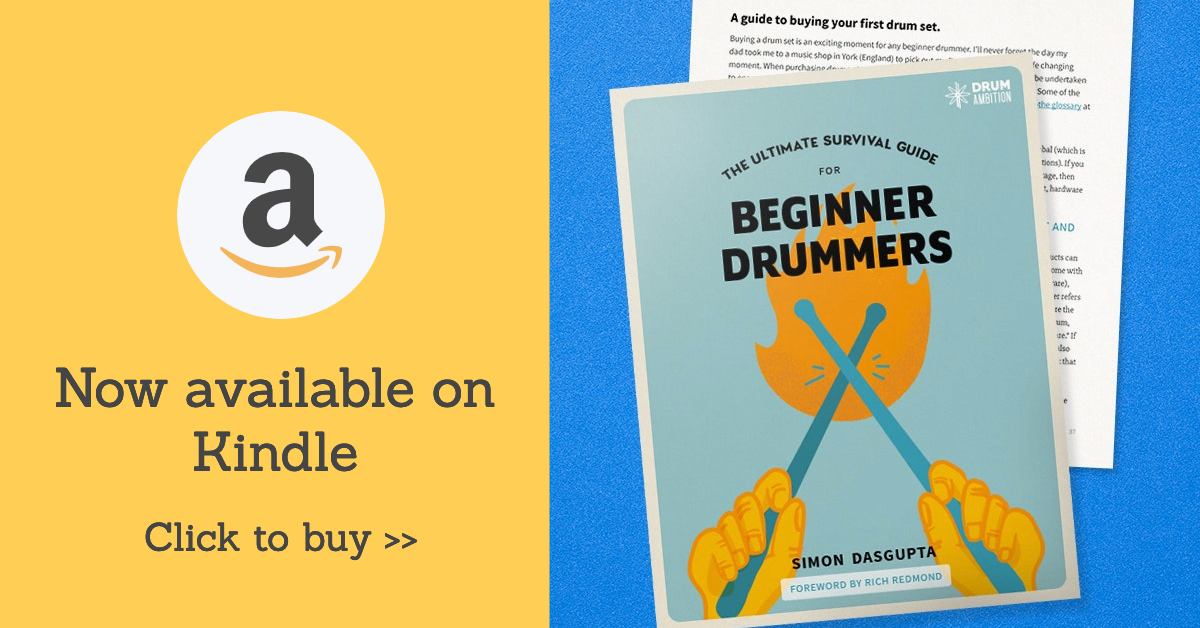Drum Ambition is an online drum lesson platform, but our Founder, Simon DasGupta, also runs a physical teaching studio in San Diego.
At this studio, we routinely help students of all levels achieve their goals, and as you can imagine, we've learned a lot along the way about those goals, expectations and the individual needs of our students.
If you are a regular visitor to this blog or a subscriber to our video lessons, you will already know that we place a huge emphasis on the value of working one-to-one with a drum teacher. It's true that online drum lessons give you the perfect start to your drumming journey, particularly if you are trying something new, on a tight schedule, or undecided about whether you want to work with a local teacher. We've written extensively about the benefits of working with local teachers, and we routinely help our students source an appropriate teaching professional when they feel they are ready to take that step.
Recently, one of our subscribers in Los Angeles reached out to us for guidance on what to look for when searching for a teacher. She was delighted with the foundation that Drum Ambition had given her, and was ready to take her playing to the next level, recognizing that working with a teacher was the best path for continued growth. Rather than ask us for recommendations on teachers, she wanted to do her own research. Naturally, a Google search on drum teachers in the Los Angeles area returned an overwhelming number of results. In order to narrow down her options, she needed guidance on important questions to ask herself and her teacher, in order to find the perfect match. We came up with a list of ten important questions to consider when making your own search. Part one of this article covers the first 5 questions. You can view Part 2 here.
Helpful related articles.
Are online drum lessons a good alternative to visiting a drum teacher?
1. What are your goals?
This is an important question to ask yourself, because it will help you narrow down appropriate teachers that will suit your needs, and will help your teacher understand how they can help you. For example, if you want to fine tune the basics and have fun learning to play along to songs, do you need to see a teacher with a Masters Degree in Music Education? On the other hand, if you are aspiring to play the drums as a career, that particular level of teacher might be a good fit for you. Having a list of goals you want to achieve will ultimately help you find a good match, and set expectations. Don't know what you don't know? Working through Drum Ambition Module 1 will help you identify areas you may need more help with.
2. Which type of drum teacher is right for you?
As you do your research, it will quickly become apparent that drum teachers come with varying degrees of experience and expertise, and it's important to understand that this might not necessarily be a bad thing. While it might be appealing to work with a professional who has her own studio, a Masters Degree in Music, touring and recording credits - these teachers usually charge between $60-$100 per hour. Are your goals in alignment with a teacher of this level? They may well be, but if you are a hobbyist looking to improve on fundamentals and take your playing to the next level, there are many teachers that can help. Just because a teacher may not have his own dedicated studio or a formal qualification, doesn't mean that he's not the perfect teacher for you. Most teachers offer a trial lesson, and this can be a great opportunity to ask questions, set expectations, and critically, find out if this is a person that will make the adventure fun and productive. You'll quickly find that when the fun and productivity factors become compromised, the whole experience breaks down quickly. It is both the teacher and student's collective responsibility to make sure this doesn't happen, and if you are motivated to learn and have found the right teacher, it shouldn't.
3. Should my teacher have qualifications?
As discussed in the last paragraph, qualifications may or may not enhance your experience, and it really does depend on your goals. A hobbyist that plays in the garage for fun will have very different needs to an aspiring music college student. If a drum teacher does not have formal qualifications, it by no means implies that they are unstudied. Most drum teachers have undergone significant hours of private training with qualified teachers and/or professional players, as well as honing their technique and style playing in the field. If their website does not outline their educational experience, then your trial lesson will be a great place to dive deep and ask some questions on this point.
4. Is it better if the drum teacher comes to me, or should I visit a studio?
The reality is that not all drum teachers have their own studio. Again, this shouldn't be seen as a negative. Finding space to run a teaching operation can be challenging due to the sometimes noisy nature of the business. (Even though electronic drums and sound dampening pads have significantly helped address this issue). Also, remember that your teacher may be a working musician, who might not be able to afford the overhead cost of a studio. Again, this shouldn't necessarily exclude them from your consideration. On the flip side, busy teachers might only offer in-studio sessions, as their schedule simply won't allow them sufficient time to travel to their clients. Every case is different, and you can establish what works best for you with a simple email or phone call. Regardless to whether you go to a studio, or whether a teacher visits your house, you might want to ensure that they are reputable, including recent customer reviews and background checks.
5. How much should it cost?
This depends on whether your teacher offers services in 30 minute, 45 minute, or one hour blocks. The hourly price range of teachers varies from between $50-$100 per hour, depending on their level of expertise, their location and their availability. If the teacher travels to your house, then a mileage fee is also often added to the total hourly rate. If the price of a local teacher proves cost prohibitive for you, then we recommend that you strongly consider learning online. Drum Ambition subscriptions start from as little as $19 per month, there are no contracts, and you can cancel at any time.


